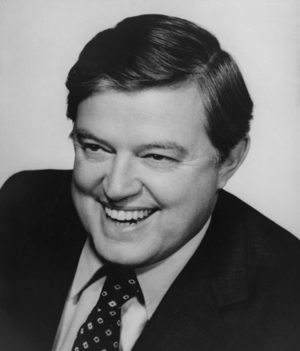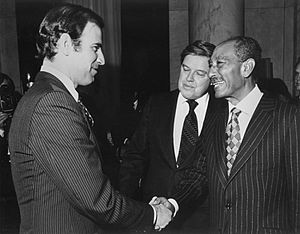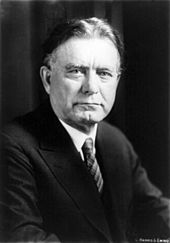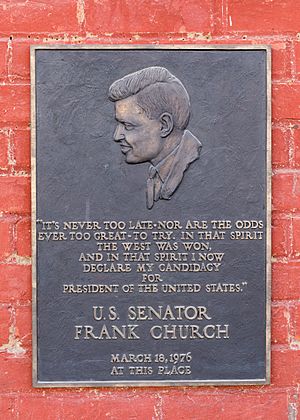Frank Church facts for kids
Quick facts for kids
Frank Church
|
|
|---|---|
 |
|
| United States Senator from Idaho |
|
| In office January 3, 1957 – January 3, 1981 |
|
| Preceded by | Herman Welker |
| Succeeded by | Steve Symms |
| Personal details | |
| Born |
Frank Forrester Church III
July 25, 1924 Boise, Idaho, U.S. |
| Died | April 7, 1984 (aged 59) Bethesda, Maryland, U.S. |
| Political party | Democratic |
| Spouse |
Bethine Clark
(m. 1947) |
| Children | 2, including Frank |
| Education | Stanford University (BA, LLB) |
| Occupation |
|
| Military service | |
| Allegiance | United States |
| Branch/service | United States Army |
| Years of service | 1942–1946 |
| Rank | |
| Battles/wars |
|
Frank Forrester Church III (born July 25, 1924 – died April 7, 1984) was an American politician and lawyer. He was a member of the Democratic Party. Frank Church served as a U.S. Senator for Idaho from 1957 until 1980.
He is the longest-serving Democratic senator from Idaho. He is also the only Democrat from Idaho to serve more than two terms in the Senate. Church was very important in how America dealt with other countries. He was known for his progressive ideas within his party.
Born and raised in Boise, Idaho, Church went to Stanford University in 1942. He left college to join the Army. In the Army, he worked as a military intelligence officer during World War II. He served in the China Burma India Theater. After the war, he finished his law degree at Stanford Law School. He then returned to Boise to work as a lawyer.
Church became active in the Democratic Party in Idaho. He ran for the state legislature in 1952 but did not win. In 1956, he was elected to the United States Senate. He beat former Senator Glen H. Taylor in a close primary election. He also defeated the current Senator Herman Welker in the main election.
As a senator, he was a close helper of then-Senate leader Lyndon B. Johnson. He was given a spot on the important Senate Committee on Foreign Relations. In 1960, Church became well-known across the country. He gave a main speech at the 1960 Democratic National Convention.
He was seen as a strong progressive and environmental lawmaker. He helped create many protected wilderness areas. Church strongly disagreed with the Vietnam War, even though he first supported it. He helped write laws in 1970 and 1973 to limit the war. In 1975, he led the Church Committee. This committee investigated government spy agencies. Its work helped create the Foreign Intelligence Surveillance Act of 1978.
In 1976, Church decided to run for president. He announced his plan on March 18, 1976. He won primary elections in Nebraska, Idaho, Oregon, and Montana. But he later stepped aside for Jimmy Carter, who became president. Church was re-elected to the Senate many times. He won in 1962, 1968, and 1974. He lost his re-election in 1980. After leaving the Senate, he worked as an international lawyer in Washington, D.C. He focused on issues in Asia. Church became sick with a pancreatic tumor in January 1984. He died less than three months later at his home in Bethesda, Maryland, on April 7, 1984.
Contents
Early Life and Education
Growing Up in Idaho
Frank Forrester Church III was born on July 25, 1924, in Boise, Idaho. His family came from the East Coast of the United States. His grandfather moved to Idaho during the gold rush after the Civil War. Frank was the younger of two sons. His parents were Frank Forrester Church II and Laura Bilderback Church. His older brother, Richard, became an officer in the United States Marine Corps.
His father owned a sporting goods store. He often took his sons fishing, hunting, and hiking in the Idaho mountains. The family was very Catholic and conservative. Frank went to St. Joseph's School and was called "Frosty." When he was young, Church looked up to Senator William Borah. Borah represented Idaho in the United States Senate from 1907 to 1940. When Borah died in 1940, Church saw his coffin at the state capitol. He said, "Because he was a senator, I wanted to become one, too."
Church finished high school at Boise High School in 1942. He was the student body president there. In 1941, he won a national speaking contest. This helped him get enough money to go to Stanford University in California. There, he joined the Theta Xi fraternity.
Serving in the Army and Law School
Church left college in 1942 when he was 18. He joined the Army after the Attack on Pearl Harbor. He was called to duty the next year. He trained to become an officer in Georgia. He also trained at Camp Ritchie, as one of the Ritchie Boys. He became a lieutenant on his 20th birthday. In the Army, he worked in military intelligence in the China Burma India Theater. He was honored in the Infantry Hall of Fame. He left the Army in 1946.
In June 1947, he married Bethine Clark. Her father, Chase A. Clark, was a former governor of Idaho. He was also a federal judge for Idaho. Their wedding was at the Clark family's ranch in the mountains. Frank and Bethine had a happy marriage.
That fall, he started at Harvard Law School. After one year, Church moved to Stanford Law School. He thought the cold Massachusetts winter was causing back pain. The pain did not go away, and doctors found it was cancer. Church was told he had only a few months to live. But he got better after another doctor used X-ray treatments. This second chance made him believe that "life itself is such a chancy proposition that the only way to live is by taking great chances." In 1950, Church graduated from Stanford Law School. He returned to Boise to work as a lawyer and teach public speaking.
Frank and Bethine had two sons. They were Frank Forrester Church IV (who died in 2009) and Chase Clark Church. Both sons were named after their grandfathers.
Becoming a Senator
First Election to the Senate
After returning to Idaho, Frank Church became active in the Democratic Party. He became the head of the Young Democrats of Idaho. In 1952, he ran for a seat in the Idaho state legislature. At that time, the legislature was mostly Republican. He lost that election.
In 1956, Church ran for the Senate seat held by Senator Herman Welker. Welker had upset many Republicans. He was against President Dwight D. Eisenhower's plans. Church entered the primary election, which was very exciting. He ran against several people, including former Senator Glen H. Taylor.
Church won the Democratic nomination with 37.75% of the vote. He just barely beat Taylor by 200 votes. Even though Church won, Taylor did not accept the results. He claimed there were problems with the voting. During the main election campaign, Church and his team traveled a lot. Church shook about 75,000 hands during the campaign. He also ran a smart campaign. He showed how fit he was compared to Welker. His slogan, "Idaho Will Be Proud of Frank Church," helped his campaign a lot. Church also supported working with other countries.
Welker's campaign focused on being against communism. This turned out to be a weak strategy. Welker also used his past work and a letter from President Eisenhower supporting him. Glen Taylor also ran as a write-in candidate. He said Church was a candidate for "corporate interests." Church won the election. He defeated both Welker and Taylor. He won with 46,315 more votes than Welker. This was a big win, even though Republicans had more money and President Eisenhower won by a lot in the presidential election.
Working in the Senate
When Church joined the Senate in January 1957, he made a mistake. He voted against the wishes of the Democratic Majority Leader, Lyndon Johnson. Johnson ignored him for six months as a punishment. Church found help from the Republican Minority Leader, William Knowland. However, Church later helped Johnson pass the Civil Rights Act of 1957. Johnson was so thankful that he made Church his close helper. He gave Church important jobs, like a seat on the respected Senate Foreign Relations Committee. This allowed Church to follow in the footsteps of his hero, William Borah.
Documents that were secret for a long time show that Church also questioned Johnson in private. This was after the 1964 Gulf of Tonkin incident. Church warned, "In a democracy you cannot expect the people, whose sons are being killed and who will be killed, to exercise their judgment if the truth is concealed from them."
Church was re-elected in 1962. He defeated former state representative Jack Hawley. He is the only Idaho Democrat to be elected more than once to the Senate by popular vote.
In 1967, some people tried to remove Church from office. This was called a recall campaign. A Republican county commissioner tried to get recall petitions accepted. But a U.S. District Court ruled that recall laws did not apply to U.S. senators. The court said it would go against the U.S. Constitution. Idaho's attorney general agreed. Most people thought this recall attempt actually made Church stronger politically. It allowed him to seem like a victim. He was re-elected the next year over Republican Congressman George V. Hansen with 60% of the votes.
Important Work in the Senate
Standing Up Against the Vietnam War
Church was a key person in American foreign policy in the 1970s. He led the U.S. Senate Committee on Foreign Relations from 1979 to 1981. Church was one of the first senators to speak out against the Vietnam War in the 1960s. This was even though he had supported it earlier. He helped write two laws to limit the war. These were the Cooper–Church Amendment of 1970 and the Case–Church Amendment of 1973.
In September 1970, Church announced on TV that those who wanted peace had won. He said that two main ideas of the anti-war movement were now official policy. These were "A negotiated peace and the withdrawal of American troops." The only question left was when troops would leave, not if they would.
Church believed that opponents of the Vietnam War needed to protect the nation and its systems. For Church, opposing the war was the "highest concept of patriotism." He said it was not about just following rules. It was about making sure the country was right, and fixing it when it was wrong.
The Church Committee Investigations
Church became nationally famous during his time in the Senate. This was because he led the U.S. Senate Select Committee. This committee studied how the government's spy agencies worked. It was known as the Church Committee. From 1975 to 1976, it held many hearings. It investigated secret and illegal activities by the FBI and CIA. The committee looked into secret U.S.-backed wars in other countries.
The Church Committee's hearings helped create the Foreign Intelligence Surveillance Act of 1978. This law set rules for how government agencies can spy.
Daniel Ellsberg quoted Church talking about the NSA. Church said, "I know the capacity that is there to make tyranny total in America." He added that these agencies must follow the law. This is so America never crosses "that abyss," from which there is no return.
The National Security Agency (NSA) had a secret operation called "Project Minaret." They monitored communications of important Americans. This included Senators Church and Howard Baker, and Rev. Dr. Martin Luther King Jr.. They also monitored other journalists and athletes who spoke against the Vietnam War. An NSA review later found that Project Minaret was "disreputable if not outright illegal."
Protecting Nature and Wilderness
Church is also remembered for his strong support for the environment. He played a big part in creating the nation's system of protected wilderness areas in the 1960s. In 1964, Church helped pass the national Wilderness Act. In 1968, he supported the Wild and Scenic Rivers Act. He also helped pass a ten-year ban on federal plans to move water from the Pacific Northwest to California.
Working with other members of Congress from the Northwest, Church helped create the Hells Canyon National Recreation Area. This area is along the Oregon-Idaho border. It protected the deep canyon from dam building. He also strongly supported creating the Sawtooth Wilderness and National Recreation Area in central Idaho in 1972.
Church was also key in creating Idaho's River of No Return Wilderness in 1980. This was his last year in the Senate. This wilderness area is huge, covering over 3,600 square miles. It is the largest wilderness area in the U.S. outside of Alaska. It was renamed the Frank Church-River of No Return Wilderness in 1984. This happened shortly after he was diagnosed with cancer. Idaho Senator Jim McClure suggested the name change. President Ronald Reagan signed the law on March 14, just before Church's death.
Frank Church was considered a progressive. This was notable because he represented one of the most conservative states. However, he was strongly against gun control. In 1979, he was the first in Congress to speak out about Soviet troops in Cuba. This helped him against claims in his 1980 campaign that he had weakened the U.S. military.
In 1974, Church worked with Senator Frank Moss to propose the first law to give federal money for hospice care programs. This bill did not pass at first. But Congress later added hospice care to Medicare in 1982.
In 1975 and 1976, a Senate committee led by Church found something important. Members of the Lockheed company had paid money to foreign governments. This was to get contracts for military aircraft. These were illegal payments made from the late 1950s to the 1970s. In 1976, it became public that Lockheed had paid $22 million in bribes. This was to sell aircraft like the F-104 Starfighter.
Later Political Career
Running for President

In 1976, Church decided to run for the Democratic nomination for president. He announced his candidacy on March 18 from Idaho City. This was his father's birthplace. He won primary elections in Nebraska, Idaho, Oregon, and Montana. But he later withdrew to support former Georgia governor Jimmy Carter. Church is the only person from Idaho to win a major-party presidential primary election since new rules were put in place. Before 1972, William Borah had won several contests in the 1936 Republican primaries.
By June, Carter had almost secured the nomination. He had time to interview people for vice president. Many thought Church would be chosen. He was an experienced senator with strong progressive views. Church tried to get friends to talk to Carter for him. Carter later said that if he had to choose quickly, he probably would have picked Church. But having more time, Carter worried about how well he and Church would work together. Church tended to talk for a long time. Instead, Carter invited Senators Edmund Muskie, John Glenn, and Walter Mondale to his home for interviews. Church was interviewed at the convention. Carter found Mondale the most compatible. So, Carter chose Mondale as his running mate.
Leaving the Senate
In the late 1970s, Church strongly supported the Torrijos-Carter Treaties. These treaties proposed to give the Panama Canal back to Panama. This idea was very unpopular in Idaho. It led to a group called the "Anybody But Church" (ABC) committee. This group was created by a national conservative political action committee. The ABC group had no official link to the 1980 Senate campaign of Republican congressman Steve Symms. This allowed them to spend as much money as they could to defeat Church.
Church lost his election for a fifth term to Symms by less than one percent of the vote. His defeat was blamed on the ABC committee's activities. It was also blamed on the national media announcing Republican presidential candidate Ronald Reagan's big win early in Idaho. These predictions were broadcast before polls closed in the northern part of the state. Many believed this caused Democrats in the more moderate Idaho Panhandle not to vote. 2021, Church is the last Democrat to represent Idaho in the U.S. Senate.
After his 24 years in the Senate, Church worked in international law. He joined a firm in Washington, D.C.. He focused on issues in Asia.
Death
Three years after leaving the Senate, Church went to the hospital. He had a pancreatic tumor on January 12, 1984. Less than three months later, he died at his home in Bethesda, Maryland, on April 7. He was 59 years old.
A memorial service was held at the National Cathedral in Washington, D.C. Then his body was flown back to Idaho. He lay in state under the dome of the Idaho State Capitol. His funeral was held in Boise on April 12 and was shown on TV across Idaho. Church was buried at Morris Hill Cemetery. This is near his childhood hero, Senator William Borah.
Legacy
Church received an honorary degree from Elizabethtown College in Pennsylvania in 1983. This honored his work for the American people. His papers were first given to his alma mater Stanford University in 1981. At his request, they were moved to Boise State University in 1984.
2023, Church is still the last Democrat to serve in the U.S. Senate from Idaho. His last election win was in 1974.
Warning About the NSA
Church was shocked by what the Church Committee learned about the National Security Agency (NSA). This agency's existence was unknown to most Americans at the time. The committee found out about its huge operations and ability to monitor electronic communications.
Some people, like Glenn Greenwald, have praised Church for his warning. Church warned that the NSA might turn its spying on American citizens. They argue that the NSA did start monitoring Americans after the September 11 Attacks.
See also
 In Spanish: Frank Church para niños
In Spanish: Frank Church para niños
- Cooper–Church Amendment
- Case–Church Amendment
- Frank Church High School – an alternative high school in Boise
- Frank Church—River of No Return Wilderness
 | Kyle Baker |
 | Joseph Yoakum |
 | Laura Wheeler Waring |
 | Henry Ossawa Tanner |



